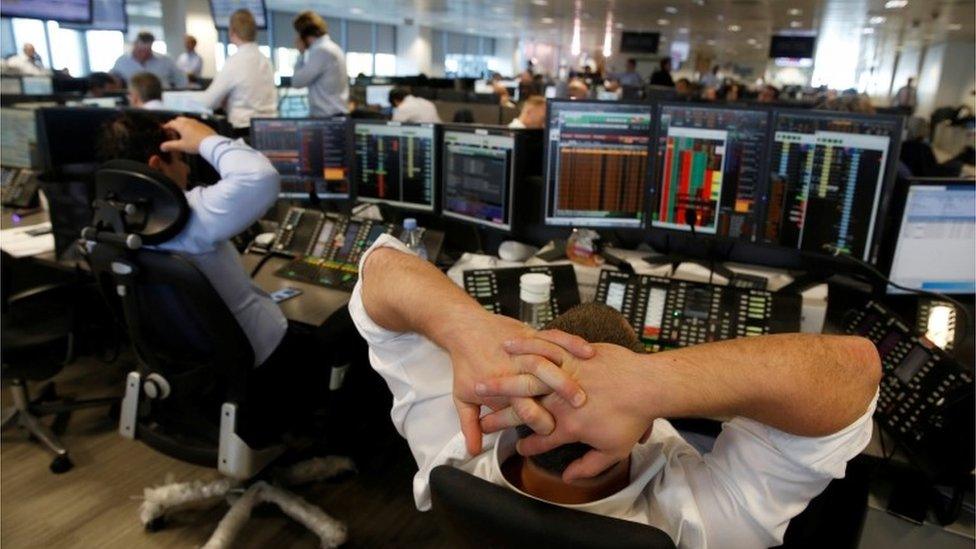The great business referendum snub
- Published
- comments

"This is not the outcome business wanted," according to Carolyn Fairbairn, the director general of the CBI. So why was business ignored?
Businesses can't vote. All they can do is raise their voice and they did try. Memos to staff, letters to newspapers, industry surveys all shouting about the risks of Brexit - all fell on deaf ears. The implicit warnings about trade, investment and jobs did not convince voters that their interests were best served by staying in the EU.
The Remain campaign hoped that a last minute armada of 1,200 businesses from Asda to Vodafone assembled in the pages of the Times might persuade workers that their employer's priorities were their priorities. It didn't.
In fact, even towns whose big employers are part of their identity saw the population ignore the declared interests of their local big business. Nissan's home Sunderland, Rolls-Royce's home Derby, Honda's home Swindon all voted to leave. Clearly many people didn't believe the management that there was/is any threat to trade or investment, or they cared about something more than their employers' success.
Arrogance?
The complacency of the financial markets looks staggering in hindsight.
Bank of England governor Mark Carney warned anyone who would listen that the pound would fall if the UK were to vote leave and yet as the polls narrowed to neck and neck, the pound continued to rise as if a Remain vote was already in the bag.
That disconnect led to a fearsome reckoning in the early hours of this morning with the pound falling 10% at one stage - more than twice the drop we saw on Black Wednesday in 1992. More words from the governor helped to calm nerves as he offered £250bn in ready cash to oil any seizures in the system and the pound regained some of its losses while the stock market also bounced back half way from early losses.
Perhaps the markets' arrogance can be explained by their Scottish experience when confidence that nationalist fervour in the polls would evaporate in the glare of cold economic reason was proved right. But this referendum had a key difference. It had one extra big issue to rival the economy or sovereignty in importance in people's minds - immigration.
It seems that business proved a poor cheerleader for the Remain campaign. It turned out that workers did not share the same level of enthusiasm as business owners for the free movement of goods, services, capital and crucially, of course, people.
Now what?
There have been some immediate effects on business. Thomas Cook suspended its online foreign exchange service to make sure the queues at its High Street counters had enough cash for holidaymakers. Petrol retailers have warned that the plunge in the pound may put two or three pence on a litre of petrol.
Other businesses say it's way too early to say what the impact will be. BMW said it there would be "no immediate change" to its UK operations and the High Street banks have made the kind of reassuring noises you would expect.
Jobs
Other firms have hinted at bigger, longer term changes. American banks JP Morgan and Morgan Stanley are able to sell to the rest of Europe from London under special "passporting" arrangements. Even before the negotiations with the EU begin, both have said they may need to move staff to the EU to serve their European customers. JP Morgan alone has warned up to 4,000 jobs could leave the UK.
Airbus employs 15,000 people in the UK and chief executive Tom Enders said. "This is a lose-lose result for both Britain and Europe. We will review our UK investment strategy, like everybody else will."
The CBI's director general, Carolyn Fairbairn, also tried to sound a note of optimism amidst the disappointment. "British businesses will adapt as they did after the 2008 crash," she said. But she wants help. The best access possible to the single market, preserving as much of the 54 international trade deals we are a party to via the EU and a "sensible" conversation about immigration to ensure access to skills.
Those are all up for grabs at the moment but the Leave campaign has pledged to move quickly to complete a trade deal with Europe. However, it's not clear how quickly Europe will be inclined to co-operate given the UK has inflicted a serious blow on the integrity of the remaining union. Messrs Gove and Johnson also want to crack on with others at a pace exceeding the snail-like progress of EU-China and EU-India deals that have taken years and are still not signed.
It's too early to say what the final impact will be - there are days, months, potentially years of negotiations ahead. But for many businesses that process starts today.